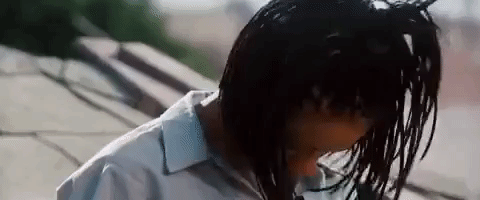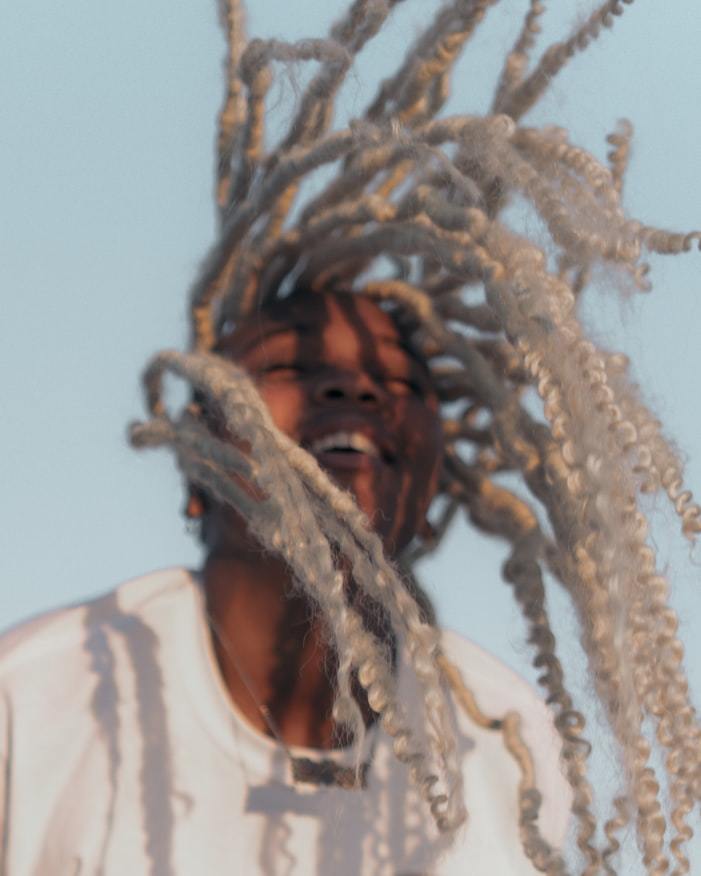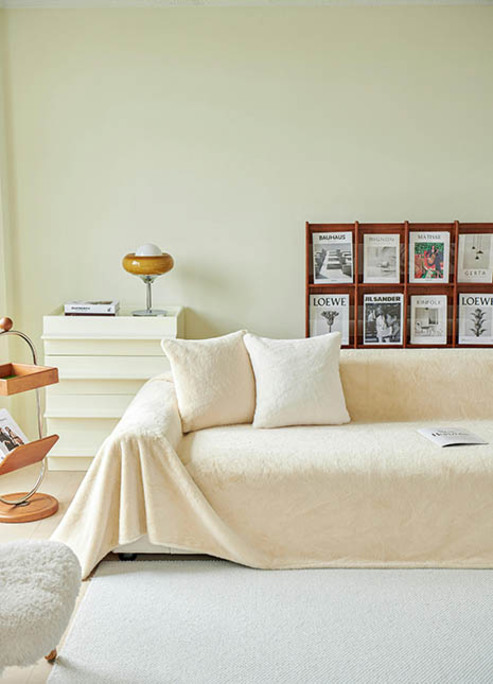Black Hair Through The White Gaze
The Reality of Hair Discrimination.
Today I love the way my hair looks and it did not always use to be that way. I love how, in its most coarse shape, it resembles a cloud moving through the sky and how it automatically moves up, when I press it down like it is intentionally trying to defy gravity. When I think about wearing it out in the streets though, just the way it is, a knot forms in my stomach because for the most part of my life I have been stuck in a constant effort to hide it.
This is a struggle and quite frankly a pain that generations of black women before me experienced, due to the constraints of a white normative society that has set straight hair as the default and forced black women to compromise themselves and damage their hair severely, to meet that standard. Racial discrimination is something most people are aware of. Hair discrimination on the other hand, which is a subset of it, will be unknown to most and is something that I for most of my life also was unaware of.
One black woman, who faced this sort of discrimination in the workplace, though, is Tracey Tanneh Chathah. CEO and founder of the natural hair company Natural The Brand: “I was fresh out of college when I started my first corporate America job and wearing my hair in headwraps. I was called into the HR office one day and they told me I had to take it off. I went through the handbook though, and it didn’t say anything about headwraps. It only said "no bandanas,” so I had to explain to HR that this wasn’t a bandana but a hairstyle, my culture, and my identity. I had to fight with them for months to get the handbook changed. It was a long three months process, just so I could wear my headwrap at work because it was deemed unprofessional and according to the handbook, associated with “gangs”.
I had to make it clear that this wasn’t what they thought it was. It was a hairstyle that represented my pride and my culture. This was the first time in my professional life that I realised my hair might not be seen as normal or professional.” Tracey’s case was not an isolated incident. In August 2020 the magazine Glamour detailed the horrific accounts of six different black women who had either been fired over their hair or were forced to spend hundreds of dollars to keep it looking straight.
“For most working people, the expectation is that you’ll be evaluated on how well you perform the tasks you were hired to do. You’re either good at your job or you’re not, right? For Black women, it’s not always that absolute. Many of us have also been judged, reprimanded, or even fired for the way we wear our hair to work. It’s called hair discrimination, and (…) it’s perfectly legal.” (Edwards, 2020).
A 2019 study from CROWN research that surveyed 1000 black women and 1000 white women in the workplace found that black women are 1.5 times more likely to be sent home from work because of their hair and 3.4 times more likely to be perceived as unprofessional in general. Furthermore, black women are 83% more likely to report being judged more harshly for their appearance than other women.
In light of all the negative connotations surrounding African-textured hair, Natural The Brand founder Tracey Chathah is consciously working towards destigmatising it. Her Instagram Account Naturalhairlovez has a following of 440 000 and tries to represent all the different types of African-textured hair and ways to style it.
“I did a blog post on my page to see if other working black women had experienced the same and it turned out that the majority didn’t feel comfortable wearing their natural hair to work because they feared that it might be seen as unprofessional. It is slowly getting better, but it is sad to see that this is still a problem in 2020.”

I always felt pressure to straighten my hair and reflect what a white normative society perceived as beauty. I felt that my dark skin was already taking me further away from that ideal of what was generally perceived as “normal” and “attractive”. Knowing that a lot of black women are shouldering this burden, too, is both comforting and upsetting.
For this article, I have interviewed black women from the UK, USA, Ghana and Germany, and all of them agree that they have been and are still being subjected to Eurocentric beauty standards of long, straight and silky hair that are reinforced by structures of discrimination and hair shaming.
Hair discrimination, however, does not only exist in the workplace. It can also be found in kindergartens and schools. According to a 2020 article by the Guardian, a wave of black and mixed-raced students in the UK and Ireland have been excluded from classes due to their hair. A recent case in the UK was 4-year-old Josiah Sharpe, who was excluded from playtime due to his “extreme” hairstyle (A normal fade cut but with afro-textured hair). A Hair Equality Report from 2019 also found that 1 in 6 black or mixed-race children has had "bad", or "very bad" experiences at school due to their hair.
Even when the outside seems aloof to the stigma surrounding afro-textured hair, the damage is still present in having these messages internalised and subconsciously policing ourselves, or being policed by family members like in the case of Vanessa Ofori: “I was told by family members that naturally-textured or tightly coiled hairstyles were unprofessional in the workplace and school. I don't think my family members meant any harm by projecting this stigma to me and subconsciously everyone wanted to fit into Eurocentric beauty standards because it was wildly accepted.”

Black hair through history:
This negative stigma surrounding afro hair was even prevailing in places where the majority of people had it, like Ghana in the 80s and 90s. “Everywhere you go in Ghana you can see the traces of colonialism. We did everything like the British. We had to because of colonial ideas where still so present and dominant. There was an old beauty ideal we had that represented African beauty. It was called Akkua’ba. However, during colonialism that was forcefully replaced with a European idea of beauty. European products for hair straightening were introduced to the Ghanaian market in the early 50s. We were told that our natural hair was dirty, not groomed and had to be straightened to look presentable. Even when we started to see through that and released that they were only damaging our hair, we carried on with it because it was just the beauty standard at that point.
All of a sudden you couldn’t work in certain offices with Afro hair anymore and European companies were capitalising on the oppressive beauty standard they installed. My mother straightened my hair once a month and every time we went to an event. To me it was torture. She used a hot comb that was heated up in the oven until it was hot and glowing. I never sat still as a child so I ended up with scars and burns. We had to do it though because our parents thought it was good for us. Once my sister Daisy tried to straighten my hair. She put the hot iron on an empty chair. My younger sister Matilda accidentally sat on it and the iron burned itself into her skin. We had to rush her to the hospital immediately. A lot of households had the hot comb so I cannot even imagine what other accidents happened. I am glad to see that now things have changed and we went back to our roots because we have a newfound understanding of where we come. We are releasing our identity and trying to identify as Africans again.”
Florence Amoakuh is a magister graduate in English and History with a concentration in African History. Her education enabled her to fit the discrimination she faced into a historical context and critically assess the messages she has been receiving from an early age, ultimately liberating her from their impact. When I asked her what makes her feel beautiful now she replied: “I love that when one sees me they know where I come from. It makes me see the beauty in my hair, my skin, and my entirety as an African woman.”
The words that were repeated throughout my three conversations with very different women were “culture” and “identity”. I never really looked at my hair as an extension of that but now I do. My hair is essentially a representation of my blackness and therefore a manifestation of an essential part of my identity. I hid it out of necessity, a sacrifice in the name of assimilation and fitting into a society that only allowed a very limited space for black women to take up in it.
That is the frustrating bit: hair discrimination is ultimately a reminder of the oppression we already face. Constant efforts to erase us, due to the fact that there is a more dominant idea out there. One that is majorly being perpetuated by the media and their representation of black women and black beauty. I do not want to condemn straight extensions, weaves, or hair straightening and say that I will not make use of these things in the future. Nevertheless, I do want to question the act of doing it to fit into a culture that has historically and is presently not accepting black women for who we are and what we look like, even if we assimilate.












